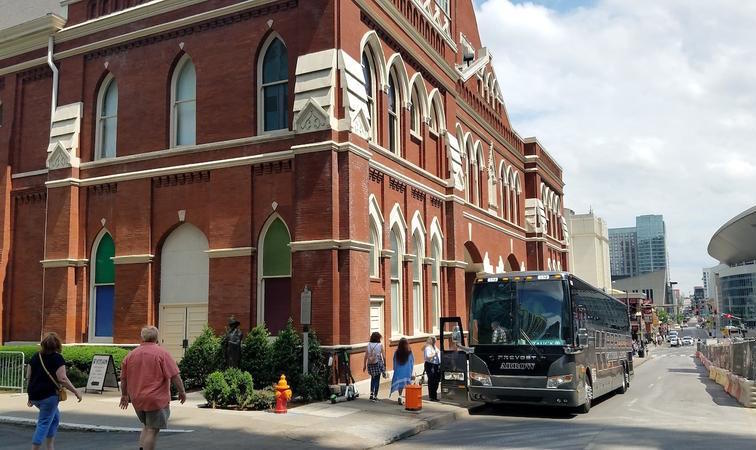
In its more than 125 years, Ryman Auditorium in downtown Nashville has hosted just about every kind of show imaginable: chuch revivals, boxing matches, the Grand Ole Opry.
But there’s one kind of performance that’s never topped the bill at the Ryman: hip-hop.
That is, until this Sunday, when the Wu-Tang Clan will play a sold-out show.
It’s far from the kind of performance that visitors typically associate with the Ryman. Usually, a certain kind of performer comes to mind — like Johnny Cash, Dolly Parton or Patty Griffin.
But this weekend, the Mother Church of Country Music will play host to New York’s quintessential rap group, which is on an international tour to celebrate the 25th anniversary of their breakout album, Enter the Wu-Tang. It’s a historic moment, as this will be the first time a hip-hop act has headlined the 2,300-seat venue.
“It’s just not intuitive to have necessarily a hip-hop show at the Ryman,” says Eric Holt, a Nashville concert promoter who also teaches about the music business at Belmont University. “It’s going to be interesting. I mean, the energy, I think, is going to be different.”
125 Years Of History
The theater opened in 1892, and in its earliest days, it hosted all kinds of gatherings and performances. Reunions of Confederate soldiers, performances by the Fisk Jubilee Singers and Harry Houdini, and a lecture by Helen Keller all filled the Ryman’s wooden pews.
“It was a church that was not exclusive, actually,” Holt notes. “The diversity in the Ryman kind of goes way back.”
In fact, the auditorium didn’t specialize in any kind of performance until a half-century after it opened. That’s when it began hosting a barn dance-style radio show featuring what was then known as “hillbilly music.”
“What happened here is that the barn dance evolved into the Grand Ole Opry,” says documentary filmmaker Ken Burns, who’s been making an eight-part series on the origins of country music.
Many cities had similar shows, but Burns says Nashville’s central location made it especially popular with touring musicians.
“It was possible for the performers to be there on Saturday night and then scatter to the winds for a week,” Burns says. “People began to gravitate to Nashville.”
The Grand Ole Opry played at the Ryman until the 1970s. Then, the radio show moved to the Opryland amusement park and a custom-built theater that was bigger and more comfortable.
Ryman Auditorium fell into disrepair and was close to being torn down. But, then in 1991, Emmylou Harris and the Nash Ramblers recorded a live album, At the Ryman, that captured its spirit and celebrated its “hillbilly dust.”
It won a Grammy.
Weeks later, the owners of the Ryman announced plans for a renovation, and musicians began to see the Ryman as a prestige venue. Rock, soul and R&B acts — from India.Arie to the Foo Fighters — all wanted to play there. A few of those artists even brought along hip-hop performers as opening acts.
“This isn’t your grandparents’ Ryman,” says Shannon Sanders, a Grammy-winning musician and record producer.
In the 1980s, Sanders was a member of one of Nashville’s first hip-hop groups, and he says the hip-hop scene here has long lived in the shadow of country: “It’s just been hard to be part of the narrative of the city’s musical story.”
But that narrative has grown more complex. There’s renewed interest in the city’s once-vibrant R&B scene, and listeners seem to have become more diverse in their tastes, switching seamlessly from country to rock to hip-hop. The Wu-Tang Clan playing the Ryman is a sign of all that, Sanders says.
“You know, the Ryman has had to grow up too, and had to grow up into what the city is,” he says. “The Wu-Tang is ready for the Ryman, but also the Ryman is ready for the Wu-Tang.”
Diverse Acts
But Pam Matthews, the Ryman’s general manager from 2000 to 2007, believes that’s a overstatement: She says it just isn’t true that the Ryman has been reluctant to book hip-hop acts.
“I did make an offer on 50 Cent,” she recalls. “And I also feel it’s possible I made an offer on Insane Clown Posse.”
Under her watch, the venue frequently brought in far more controversial perfomers, including standup comedians like George Carlin.
But, until recently, there just haven’t been many hip-hop performers who were looking for a venue of the Ryman’s size, Matthews says. They’ve instead tended to go to small nightclubs or big arenas.
They also often want spaces where people can get up and move, which isn’t easy with those pews.
“The pews are where they are,” she says. “They are screwed into that 125-year-old wood, and they’re not coming out.
But hip-hop fans are starting to change — particularly the ones who came of age listening to the Wu-Tang Clan in the 1990s. They’re now older, more affluent, and maybe a little more interested in sitting.
“You may actually have 40-year-olds bringing their kids. I’m not sure,” Matthews says.
For its part, the Ryman isn’t making a big deal about the show. In a written statement, the auditorium’s leaders say they’re always aiming to bring in a diverse audience.
“From a 10-show residency with country mega-stars Little Big Town to an intimate performance with pop superstar Harry Styles, the Wu-Tang show further builds on our promise to bring in acts that our diverse Nashville audience wants to experience,” wrote Sally Williams, Opry Entertainment Group’s senior vice president for programming and artist relations.


